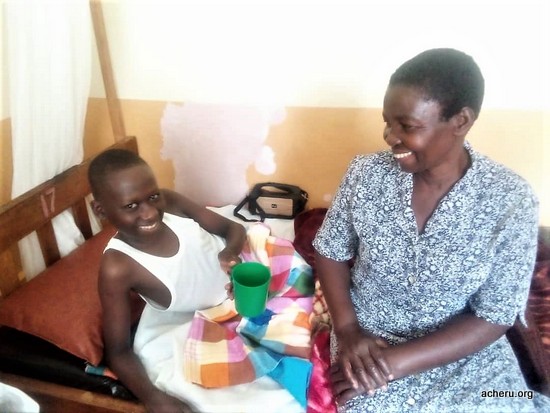|
|
| February 2022 report: The impact of covid on Acheru, and on Uganda |
| For two years now we have suffered disruption from Covid. I am fortunate in being able to work from home when necessary, but at Acheru they've had to contend with a range of restrictions which have caused a lot of problems. Travel restrictions caused difficulty for community work and home visits as well as making it hard for people to bring children to Acheru or to clinics. Before much was known about Covid, there was a lot of fear. All this meant that many children who needed medical treatment weren't getting it, and there will be many problems to deal with when the threat from Covid recedes. But that doesn't look like happening just yet, and we've heard of a surge in Omicron cases there. The official statistics don't show very high numbers in Uganda, but that's to be expected as I'm sure testing is very limited. The reality is different, we've had cases at Acheru among staff and associates and we hear of the problems faced by hospitals. |
| Acheru is small, so it obviously presents a problem if a child there has Covid. There have been fewer inpatients since Covid started to spread there, but outpatient numbers are rising, a large part of the increase being children with cerebral palsy and I intend saying more about this in the next circular. Mubarak, who I've written about before, had to have urgent surgery at CoRSU. Unfortunately, while he was there one of his carers was found to have Covid and without a carer he couldn't remain at CoRSU so was brought back to Acheru. He is still very ill, so his treatment is demanding particularly for Isaac, our nurse, who must change his dressings several times each day. |

|
| Nurse Isaac applying dressings to Mubarak |
| The Acheru staff must also undertake the tasks normally dealt with by a carer while efforts are made to find a replacement. In hospitals and clinics there, every patient must come with a carer who can deal with the patients feeding, washing, and other non-medical tasks, meanwhile Isaac and Margaret are looking after all Mubarak's needs. |

|
| Mubarak with Acheru matron Margaret |
| When we heard of the first Covid cases in Uganda, we didn't imagine we'd be facing these problems two years later. Even when the risk of severe infection is gone, huge problems will remain with so many missing out on medical treatment or unable to attend school. Education is the future for so many Ugandan children, but school closures have been disruptive. Now that they are opening again, we fear many children won't be returning. Parents can no longer afford the fees or have become dependent on the children for work at home, or the children may simply have lost interest. There will also be schools which can't re-open, and I've even heard of Kampala schools finding they can make more money using their grounds as car parks. Fields of Life, who have built so many schools in Uganda, have tried to maintain their children's education by providing home learning packs, with teachers providing coaching and marking. Their biggest fear will be the poverty resulting from the Covid restrictions, with some girls being married off or becoming pregnant while they're still children. We worry about the long term impact for Uganda after the threat of severe illness has receded, and it will leave people fearful of further viruses. I've been looking at reports from early 2020, and the fear caused by the first Covid infections. At the time, our physiotherapist at Minakulu wrote: |
| "I have never seen such a tragedy in my life before. Life seemed OK, work continued after the Christmas break and patients were being brought in as usual in January 2020. Suddenly we heard of the coronavirus which had invaded the people of China, but hoped it would not reach our country. When Ebola, another deadly virus, invaded the northern part of our country it was contained and it passed without spreading to other parts of our country or to other countries. |
| "In March our president announced that the virus is now here in Uganda, with one person infected. Immediate measures were introduced to fight the spread of the virus, and this affected the turn up of patients at the unit due to fear of contracting the virus. Public transport, schools, churches, markets were closed along with other measures. Life became hard with high food prices. This has reminded me of the hunger we had during the civil war." |
| Now in the aftermath of Covid we'll need to consider the needs of children who couldn't be brought for treatment, or whose treatment was interrupted - this has been a big setback for them, the consequence for many being prolonged suffering. |
|
|
|



